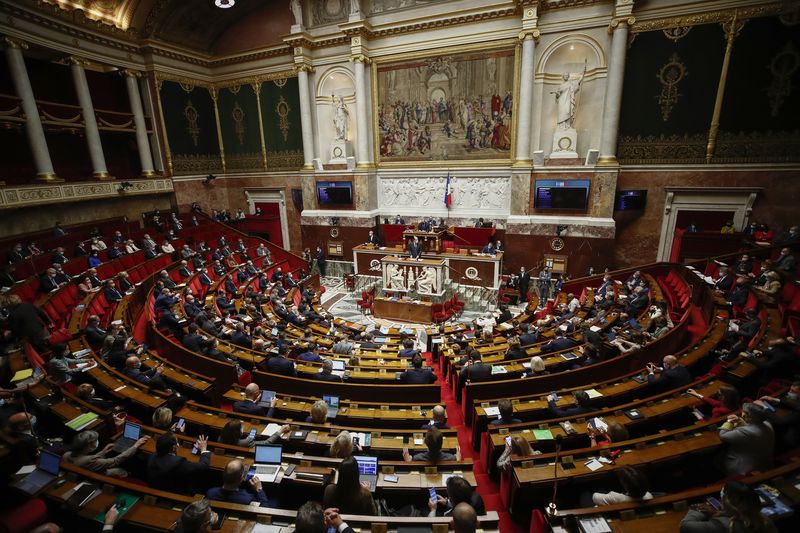Through an interpartisan project, a legislator who declares himself an opponent of President Macron is seeking to make explicit in French law an article that combats “discrimination related to texture, length, color and hairstyle”.
When Olivier Serva announced that he would seek the support of all parties on the political spectrum for a project which aims to prohibit by law any discrimination in the hairstyle of the black population in France – except in the far right of the National rally, he declared radio France Info-, he immediately recalled a stormy trial of an Air France employee which lasted 10 years in court, and which laid bare the legal void which exists concerning the powers whose companies have when they require certain haircuts, which particularly affects , denounces the parliamentarian, who wear hairstyles and natural Afro braids.
Serva, a parliamentarian who left President Emmanuel Macron’s centrist party, La República en Marcha (now renamed Renaissance), and who now votes in line with another centrist party, but who declares himself an opponent of the president, indicated that the project seeks to combat “discrimination related to hair texture, length, color and style,” reported The Guardian. The motion will be tabled in parliament for the European autumn.

“Just as the motto of the Republic is ‘liberty, equality, fraternity’, it is a question of allowing everyone to be as they are and as they want to be, whether at work or elsewhere,” he said. he told France Info radio. And he added that, in his opinion, the project aims to “fight against all forms of discrimination related to the texture, length, color and style of hair”.
The inspiration, he assured in the same media, came from the controversial case of a black man, an Air France assistant hired by the company in 1998, who had used since 2005 a hairstyle where his hair was tied in “bun,” which “wasn’t allowed” by the airline for male staff, but it was for female staff.
In order to keep working, the assistant used a wig for years, until in 2012 he decided to take the company to court for discrimination. As El Universal recalls, after going to court, he was quickly suspended for violating the dress code.
It took 10 years after the case went to court for the French Court of Appeal to intervene and in November 2022 declare Air France’s measure as “differential treatment” which fell into discrimination, but exposed the legal vacuum. in this case.
“The way of doing one’s hair is neither a part of the uniform nor its extension”, we read in the judgment, which adds that the “social codes” mentioned by the Court of Appeal “are not criteria objectives justifying a difference in treatment between men and women.

This case, Serva said, is proof of the need to legislate on the matter in France. He added that there are also women who risk irreparably damaging their hair by applying chemicals to straighten it, and although he did not present data in France, he showed figures collected from UNITED STATES. Figures which, according to him, should be similar between the two countries.
In one of them, funded by Dove and LinkedIn, it is claimed that two-thirds of black women in the United States have felt obliged to change their hairstyle before presenting themselves for a job interview, an idea that Joëlle Dago-Serry, professional trainer for French television and commentator, he approved.
During a broadcast on RMC radio, he said that “of course there is discrimination… my mother straightened my hair for the first time when I was seven or eight years old. I am from the generation in which we straightened our hair a lot with dangerous products to pass the barrier of a job interview, or to progress in a career.
According to The Guardian, when Sibeth Ndiaye, a former adviser to Macron, became spokesperson for the French government during the current president’s first term, her natural Afro hairstyle was the subject of racist comments on social media.
“Natural Afro hair is seen as something that is not styled, understood or accepted, commented on. Behind the word discrimination are real stories of people who have the right qualifications and skills, but who don’t get the job because they don’t have the so-called ‘good hair’,” added Joëlle Dago- Serry.
In March 2022, the United States House of Representatives passed a bill prohibiting discrimination based on hair texture or hairstyle, acknowledging that people of African descent have been “systematically” denied employment opportunities. education and work for their hair.
The Crown Act bill was sponsored by Bonnie Watson Coleman, the first African-American woman to represent the state of New Jersey in Congress and a vocal advocate for black women’s rights.
“For African Americans, natural hair growth is often considered ‘unprofessional’ simply because it does not conform to white beauty standards. Discrimination against African American hair is discrimination against African Americans,” Coleman said in a statement after the bill passed.
In 2019, California became the first US state to ban discrimination against natural hair, recalls The Guardian.
Source: Latercera
I am Robert Harris and I specialize in news media. My experience has been focused on sports journalism, particularly within the Rugby sector. I have written for various news websites in the past and currently work as an author for Athletistic, covering all things related to Rugby news.


